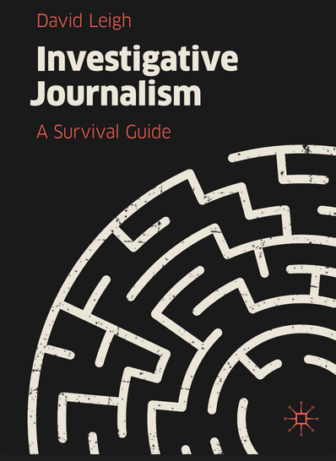

Photo: Shutterstock
So You’re an Investigative Reporter. Here’s How to Make Your Boss Like You Anyway.
Read this article in

Photo: Shutterstock
Editor’s Note: Investigative reporters have a bit of a reputation for being troublemakers — both outside and inside their newsrooms. Sometimes, this can get in the way of their work. In his new book “Investigative Journalism: A Survival Guide,” David Leigh, who is a journalism professor at City University London and The Guardian’s former investigations executive editor, devotes a whole chapter to investigative journalists’ relationships with their bosses. After sharing case studies of mutinies at his former workplaces (The Times of London, The Observer) and at other newsrooms (Fox, CBS), he goes on to give sensible advice for investigative journalists who wish to not only get along with their bosses, but to get their stories published. The following is an excerpt from Leigh’s guide, which is out on September 30 from Palgrave MacMillan.
 This chapter may appear to characterise media bosses purely as the enemy. I have indeed known some journalists who go to work every day in order to glower at their editors and mutter about conspiracies against them. But this does not improve their output. I have also myself had bosses who were masterly, inspirational, supportive, and dedicated. I am enormously grateful to them, because without their help I could not have found things out and got them published.
This chapter may appear to characterise media bosses purely as the enemy. I have indeed known some journalists who go to work every day in order to glower at their editors and mutter about conspiracies against them. But this does not improve their output. I have also myself had bosses who were masterly, inspirational, supportive, and dedicated. I am enormously grateful to them, because without their help I could not have found things out and got them published.
So here is an important final point to be made: despite their role in restraining you and frustrating you, it is a good idea to try and look at the world through the eyes of your boss. A corrupt media environment does indeed often unfairly inhibit investigative reporting, but there are also genuine problems which investigative journalists will pose for an employer. Investigative journalists, to be frank, can be a real pain.
Their work can be expensive. To detach a whole reporter, or worse, an entire team of reporters, from their day-to-day duties in order to pursue a lengthy investigation, costs a lot of money, which has to come out of some editor’s budget. Cars, plane tickets, hotels, hiring experts, or foreign fixers — the expenses claims can mount up shockingly fast. What might seem a reasonable budget for an hour-long TV documentary, can be insanely expensive for the Auchtermuchty Gazette.
Even worse than the expense can be the uncertainty. Editors have daily or weekly slots to fill. Newspapers have more flexibility than TV and magazines, and websites have fewer issues about length. Nevertheless, the kind of journalism they all like best is the sort that approximates a factory product — it is of a predictable standard size and will become available at regular intervals. Investigative journalism is not like that. Its results cannot be guaranteed. Sometimes it will simply fail to deliver. Often the timescale is unpredictable, and sometimes the length is enormous. For a commissioning editor, this is all something of a nightmare; and some of the methods of managing the nightmare, such as over-commissioning in order to have a steady supply of viable investigative stories, can just end up causing more confusion and ill-feeling.
Furthermore, an investigative story, even if it is delivered successfully, may be a very unattractive editorial product. Editors like broad-brush, brightly coloured, easy-to-understand allegations that a casual viewer can quickly take in. But in order to be legally safe, many of the wordings of an investigation may be vague, cautious, or excessively muted. It is vital to be meticulous and not all the facts may be known on first publication. This may make a story seem pedantic or even confusing. Exposures of crime, fraud, or other wrongdoing may involve the laborious picking apart of cover stories, false transactions, and efforts at concealment. Dry details of accountancy discrepancies may be required. The result can be, to be honest, very tedious.
The “detective” mindset can also produce an equally tiresome and sometimes obsessional approach in the reporters who put together investigative copy or cut together an investigative programme. After too long a period of trying to penetrate other people’s secrets, the journalist can sometimes lose all perspective. I remember once exploding in rage at a hapless news editor in London because he failed to see the significance of an obscure discovery I had made involving a case of bribery in darkest Romania. I was right — the facts turned out to be significant. But he was right too — those facts were crushingly boring, and he didn’t want to put them on his news list.
Allied to this are the personality problems that investigative journalists sometimes develop. Confronted day by day in the outside world with powerful people telling them lies or uttering threats, the successful investigative reporter needs to develop a thick skin; an inner self-confidence; and a willingness to go into battle. Unfortunately, these necessary attitudes can then also bleed over into belligerent internal dealings with colleagues and bosses. The charitable word for these traits is “cantankerous”. The less charitable words are all unprintable.
And finally, the story which arrives on an executive’s screen so late and lengthy — and seemingly dull — may nevertheless turn out to be explosively dangerous. If it is any good, it will attract the ire of those powerful people and their massed ranks of high-priced lawyers. At best, there will be complaints which will take hours of executive time to deal with. At worst, there will be frighteningly expensive lawsuits, hostile pressure from powerful connections at the very top of the organisation, and the prospect of the sack for a relatively dispensable editor if it all goes wrong. The old BBC witticism about internal scandals is potent: “Deputy heads will roll”.
Investigative Journalists Can Be:
- Expensive
- Irregular
- Obsessive
- Cantankerous
- Uncertain
- Boring
- Dangerous
Not having your story published is nevertheless one of the most frustrating and infuriating aspects of the investigative reporter’s life. So is there any way of checking what’s going on with your bosses? Is the “spiking” of your material their fault or actually your fault? Reporters need sensible advice, not paranoia, when organisations are reluctant to run their stories. So here is a very short checklist of what to do to minimise the aspects that could be your fault.
First, try and deliver copy that is reliable. That means don’t offer unrealistic delivery dates. It means don’t promise more than you can deliver. It means honesty. There is not an uncommon situation, particularly in the world of TV, where investigative reporters can get a commission and some development money before discovering that their original sales pitch was over-optimistic and there isn’t actually a story. As they’ve already spent the money, there is then a dangerous incentive for exaggeration or even fakery. This is how investigative journalism makes itself disreputable and unpopular.
Secondly, don’t get stuck in a groove. A measure of tenacity, or even obsessiveness, is valuable. But to spend every waking hour chasing a single story tends to put blinkers on a reporter after a while. They come to believe that every minor development in their quest is journalistically interesting. Often, it isn’t. Take a long walk. Find something else to write about for a while.
Finally, don’t forget that you are in the news business. An elaborate investigation into one of the many scandals that plague the world is more likely to find an outlet if it chimes with the current zeitgeist, and even more so if it relates to a live news story. Lengthy evidence of sexual misconduct by, say, Donald Trump is not really very interesting when Trump is merely an obscure New York property developer. It is more intriguing when he becomes TV celebrity host of “The Apprentice”. The story is gripping when Trump becomes president of the US. And it is truly hot news if the week before he has strongly denied such allegations and controversy is raging.
On the other hand, if the president has already resigned because of similar evidence published last week by others, then your story has lost out in this game of snakes and ladders. It goes off the front page and slithers right down towards the bottom of a snake again.
Likewise, if a giant asteroid has just crashed into the White House, vaporising all within, you might as well forget your sex-scandal investigation. No one will want it.
As a reporter, there is no point in becoming indignant that you are forced to be a player in this irrational game. The sensible thing to do is to accept that news timing and the news environment are fundamental factors, and set out to handle your bosses accordingly. Finding things out is only half your task. The other half is the job of actually getting them published.
How to Deal with Bosses:
- Be reliable.
- Don’t get stuck in a groove.
- Try to find news pegs.
 David Leigh is a journalism professor at City, University of London. He was head of investigations at the Guardian for 15 years; a journalist for The Times, the Observer, and The Scotsman; and the first Laurence Stern Fellow at The Washington Post. He was also a TV producer at This Week and World in Action. He has won numerous journalism awards and is the author of several books, including Wikileaks: Inside Julian Assange’s War on Secrecy (2011).
David Leigh is a journalism professor at City, University of London. He was head of investigations at the Guardian for 15 years; a journalist for The Times, the Observer, and The Scotsman; and the first Laurence Stern Fellow at The Washington Post. He was also a TV producer at This Week and World in Action. He has won numerous journalism awards and is the author of several books, including Wikileaks: Inside Julian Assange’s War on Secrecy (2011).








